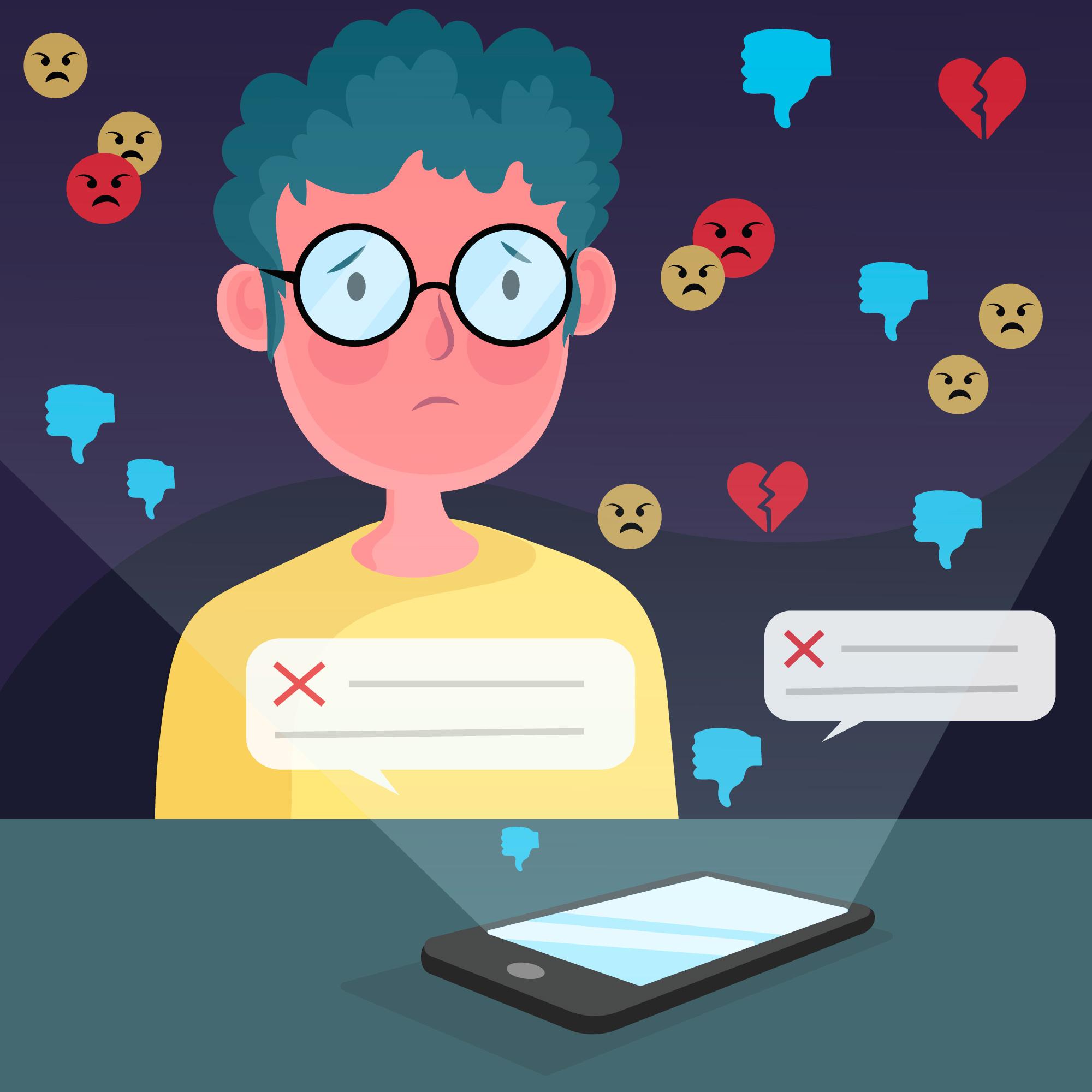Both repression and suppression have their pros and cons. Repression can help protect us from overwhelming anxiety or trauma but has been linked to mental health issues in the long term. Suppression can help us maintain control over our emotions in social situations but can also lead to increased stress levels.
Repression
(Image by Freepik)

Repression is a psychological defense mechanism that involves pushing down unwanted or distressing thoughts and emotions into the unconscious mind. It often occurs unconsciously, meaning we may not even be aware that we are repressing certain feelings or memories.
This process can have both positive and negative effects on our mental health. On one hand, repression can help us cope with traumatic experiences by allowing us to temporarily put them out of our minds until we’re ready to face them. However, if these repressed feelings are never addressed or processed, they can lead to emotional disorders such as anxiety and depression.
In addition, repression can also impact our relationships with others. When we repress emotions like anger or sadness towards someone else, it may lead to passive-aggressive behavior or resentment over time.
It’s important to note that while repression may offer temporary relief from difficult emotions, it’s not a sustainable long-term solution for managing mental health concerns. Seeking support from loved ones or a mental health professional can be helpful in addressing underlying issues that contribute to the need for repression in the first place.
Suppression
(Photo by Markus Winkler on Unsplash )

Suppression is the act of consciously choosing to avoid or ignore certain thoughts, feelings, or impulses. It involves a deliberate effort to push away unwanted emotions or desires.
One common example of suppression is when someone tries to suppress their anger in order to maintain composure in a difficult situation. In this case, the person may be aware of their angry feelings but chooses not to express them outwardly.
However, while suppression can sometimes be effective in the short term, it often leads to negative consequences over time. By pushing down our emotions and desires repeatedly, we may end up feeling disconnected from ourselves and others.
Moreover, suppressing our emotions can also lead to physical symptoms such as headaches or stomach problems. It’s important for us as individuals to recognize when we are suppressing our thoughts and feelings so that we can work towards understanding them instead of simply ignoring them.
Repression Vs. Suppression – Key differences
Repression and suppression are two psychological defense mechanisms used by individuals to cope with unwanted thoughts, emotions or actions. Although these terms are often used interchangeably, there is a significant difference between the two.
Repression involves unconsciously pushing negative feelings or memories into the subconscious mind. This means that the individual is not aware of their repressed thoughts until they resurface again. Repression can lead to emotional and behavioral problems if left unaddressed.
On the other hand, suppression involves consciously pushing unwanted thoughts or feelings away from immediate awareness. Unlike repression, individuals who use suppression have control over their thoughts and can choose when to suppress them.
The key difference between repression and suppression lies in conscious awareness. While repression occurs without our knowledge, suppression happens with deliberate intent.
Both repression and suppression have advantages and disadvantages depending on individual circumstances. However, it’s important to note that both methods can negatively impact mental health if relied upon excessively.
Understanding the differences between these two mechanisms can help individuals make informed decisions about how best to manage their emotions in different situations.
Pros and cons of repression
Repression is a defense mechanism that helps individuals push away unwanted thoughts and emotions into their unconscious minds. Here are some potential pros and cons of repression:
Pros:
- Repression can help protect an individual’s mental health by blocking out traumatic events or memories.
- It can help people maintain social harmony by keeping negative emotions hidden from others.
- By repressing negative thoughts, an individual may be able to focus more on positive aspects of life.
Cons:
- Repression can lead to unresolved emotional issues if the underlying problem is not addressed.
- Over-reliance on repression as a coping mechanism can hinder personal growth and self-awareness.
- If repressed feelings resurface in unhealthy ways, such as through physical symptoms or destructive behavior, it could cause additional problems.
While repression may have some benefits in specific situations, it should not be used as the only means of dealing with difficult emotions. Seeking professional support or finding healthy outlets for expression could be beneficial for long-term emotional wellbeing.
Pros and cons of suppression
Suppression can be a useful coping mechanism in certain situations, but it also has its drawbacks. One of the main benefits of suppression is that it can help you maintain emotional control during stressful or high-pressure circumstances, such as public speaking or job interviews.
However, suppressing emotions for an extended period of time can have negative consequences on your mental and physical health. Ignoring your feelings may cause them to resurface later with greater intensity, leading to outbursts or breakdowns. Additionally, consistently suppressing emotions over time can lead to chronic stress and increased risk for depression.
Another potential disadvantage of suppression is that it may hinder communication and relationships with others. If you are constantly hiding how you truly feel from those around you, they may not fully understand where you’re coming from or what might be bothering you.
It’s important to note that there are times when suppression might be necessary, such as in emergency situations where quick decision-making is required. However, relying on this coping mechanism too frequently could ultimately do more harm than good.
While there are some advantages to using suppression in moderation, it’s crucial not to rely on this tactic as a long-term solution for managing difficult emotions.
When to use repression ?
Repression can be a useful tool in managing emotions, particularly when dealing with trauma or other difficult experiences. However, it is important to use repression carefully and strategically.
One situation where repression may be appropriate is when someone has experienced an overwhelming event that they are not yet ready to process. In this case, pushing the memories or feelings aside temporarily can help the person cope and function day-to-day.
Additionally, some people may find that they need to repress certain emotions in order to maintain relationships or professional standing. For example, a boss who must fire an employee may feel sadness at having to do so but will need to repress those feelings in order to carry out their job duties effectively.
However, it’s worth noting that using repression as a long-term coping mechanism can have negative consequences. Repressed emotions may resurface later on and cause even more distress than if they had been dealt with earlier. Therefore, it’s important for individuals who choose to repress their emotions to also seek support from mental health professionals when needed.
When to use suppression?
There are certain situations where suppression might be a more appropriate response than repression. One such situation is when dealing with overwhelming emotions that could potentially lead to harmful actions, such as anger or sadness. In these cases, it may be necessary to suppress the emotions in order to maintain control and avoid causing harm to oneself or others.
Another situation where suppression may be useful is in managing cravings or addictive behaviors. By suppressing the urge to engage in these behaviors, individuals can work towards breaking their addiction and developing healthier habits over time.
Suppression can also be beneficial when it comes to certain types of thoughts or memories that may cause distress or anxiety. Instead of repressing these thoughts entirely, which can lead to psychological issues down the line, individuals can use suppression techniques like mindfulness meditation or cognitive behavioral therapy (CBT) to acknowledge and manage them in a healthy way.
However, it’s important to note that long-term suppression of emotions or thoughts can also have negative consequences on mental health. It’s crucial for individuals who regularly rely on suppression as a coping mechanism seek professional help from therapists or counselors who specialize in this area.
Featured Image By – Steve Buissinne from Pixabay








